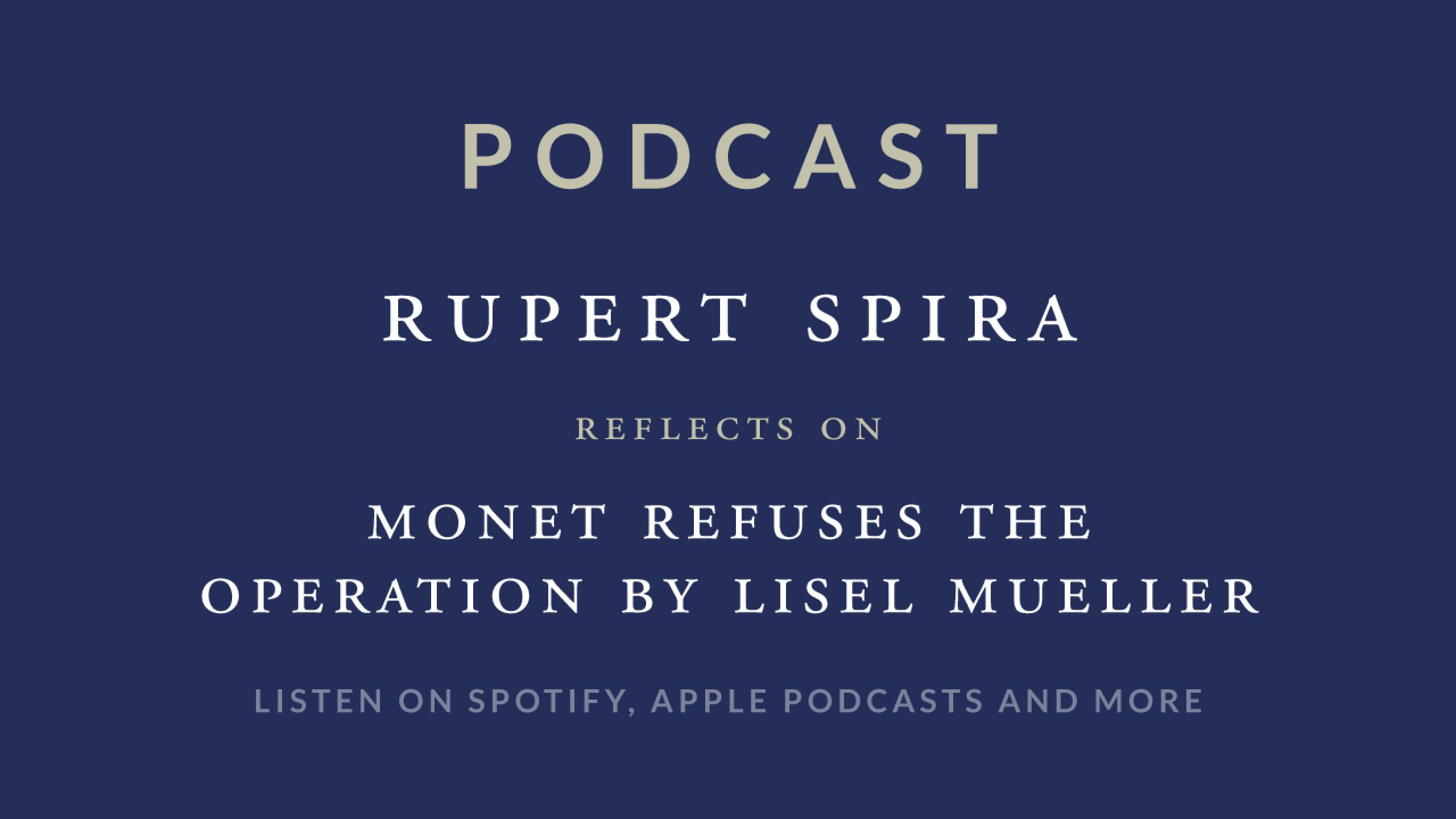Doctor, you say there are no haloes
around the streetlights in Paris
and what I see is an aberration
caused by old age, an affliction.
I tell you it has taken me all my life
to arrive at the vision of gas lamps as angels,
to soften and blur and finally banish
the edges you regret I don’t see,
to learn that the line I called the horizon
does not exist and sky and water,
so long apart, are the same state of being.
Fifty-four years before I could see
Rouen cathedral is built
of parallel shafts of sun,
and now you want to restore
my youthful errors: fixed
notions of top and bottom,
the illusion of three-dimensional space,
wisteria separate
from the bridge it covers.
What can I say to convince you
the Houses of Parliament dissolve
night after night to become
the fluid dream of the Thames?
I will not return to a universe
of objects that don’t know each other,
as if islands were not the lost children
of one great continent. The world
is flux, and light becomes what it touches,
becomes water, lilies on water,
above and below water,
becomes lilac and mauve and yellow
and white and cerulean lamps,
small fists passing sunlight
so quickly to one another
that it would take long, streaming hair
inside my brush to catch it.
To paint the speed of light!
Our weighted shapes, these verticals,
burn to mix with air
and change our bones, skin, clothes
to gases. Doctor,
if only you could see
how heaven pulls earth into its arms
and how infinitely the heart expands
to claim this world, blue vapour without end.
Lisel Mueller was born in Germany in 1924 and lived most of her life in the United States until her death at 96 in 2020. And it’s all the more poignant to know that she wrote this poem as she herself was losing her eyesight.
The poem recounts an imaginary conversation between the impressionist painter Claude Monet (1840–1926) and his doctor after his doctor had recommended that Monet have his cataracts removed.
Through Monet’s words, Ms. Mueller interprets his impressionism as implying that what is really out there in nature is far more closely interwoven with the fact of perception than the realists and classical physicists would have us believe. Monet is not painting things, he is painting perception. And perception is always one experience, not many things. There is always just the experience of seeing.
Doctor, you say there are no haloes
around the streetlights in Paris
and what I see is an aberration
caused by old age, an affliction.
I tell you it has taken me all my life
to arrive at the vision of gas lamps as angels,
to soften and blur and finally banish
the edges you regret I don’t see,
to learn that the line I called the horizon
does not exist and sky and water,
so long apart, are the same state of being.
What is from the doctor’s point of view a gradual deterioration in Monet’s ability to see reality, is, in Monet’s view, a revelation. It is a gradual dissolution of his previous inability to recognize the nature of reality, a loss of his belief in the conceptual categories that thought has superimposed upon his experience, fragmenting what he refers to as ‘the same state of being’ into an apparent multiplicity and diversity of objects.
Before the evidence of perception is interpreted by thought, all we see is a play of light, refracted into many colours, but always one thing. The world as normally understood is what we think it is, not what we perceive it is.
What can I say to convince you
the Houses of Parliament dissolve
night after night to become
the fluid dream of the Thames?
Lisel Mueller evokes the experience of dreams, where the world seems fluid, one thing morphing into another, hinting that the world we experience may be closer to the activity of a great mind rather than a collection of solid, physical particles.
And here she is possibly giving a taste of what was to follow in Cezanne’s painting where he takes this even further, not simply reducing the so-called ‘physical world’ to perception but reducing perception to pure consciousness.
I will not return to a universe
of objects that don’t know each other,
as if islands were not the lost children
of one great continent.
In these troubled times, she might have added:
I will not return to a world
of people that don’t love each other,
as if they were not all the lost children
of one all-encompassing mother.
Everything is tending towards its source – not slowly, inexorably disintegrating into the atoms and molecules out of which they are made but dissolving into the consciousness from which they emerge.
All good poems have a power that extends beyond their meaning. Meaning may also be enshrined in the rhythm and lyricism of words. This is why it is important that poetry be read out loud. It also explains why it is so valuable to learn poetry by heart. I consider the learning and reciting of poetry a spiritual practice in its own right.
I often recite this poem to myself and notice its power to affect not only the dissolution of the distinction between discrete objects that we believe we perceive in nature but, by extension, its power to dissolve the primary distinction between self and other. In this context it is hard to distinguish among a poem, a prayer and a hymn.
You can listen to this episode on the Rupert Spira Podcast.
https://rupertspira.libsyn.com/episode-23-reflections-on-monet-refuses-the-operation
For more poetry, why not take a look at Jenny Beal's conversation with Rachna Chowla about Rachna's poety?

